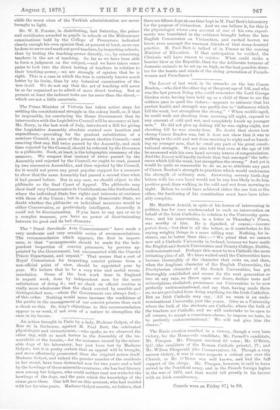The Lancet of last week, in its remarks on the
late Canon Beadon,—who died the other day at the groat age of 102, and who was the last person living who could remember the Lord George Gordon riots, having been held up as a child of three to see the soldiers pass to quell the rioters,—appears to intimate that his perfect health and strength was partly due to " influences which kill the weak, but strengthen the strong." " When middle-aged, he could walk out shooting from morning till night, exposed to any amount of cold and wet, and completely knock up younger men." He did not give up fishing till he was eighty-eight, nor shooting till he was ninety-four. No doubt that shows how strong Canon Beadou was, but it does not show that it was to walking in the cold and wet from morning to night and so knock- ing up younger men, that he owed any part of his great consti- tutional strength. We are also told that even at the age of 100 he answered with his own hand seventy letters of congratulation. And the Lancet will hardly include that feat amongst" the influ- ences which kill the weak, but strengthen the strong." And yet it would be quite as reasonable to do so, as to attribute any part of Canon Beadon's strength to practices which would undermine the strength of ordinary men. Answering seventy birth-day- letters with his own hand would not be any less likely to do him positive good, than walking in the cold and wet from morning to night. Before he could have achieved either the one feat or the other, the hardening of his constitution must have been toler- ably complete.


































 Previous page
Previous page